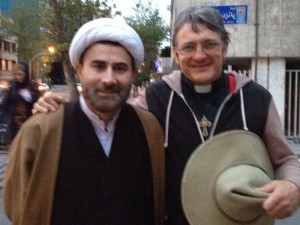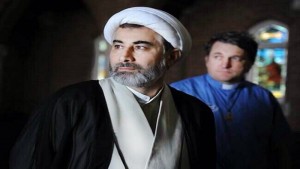
Sheikh Mansour and Father Dave in Tehran in April 2014
It has been five years since Sheikh Mansour Leghaei was forced to leave Australia for reasons that were never disclosed to him!
It has been more than five years since the Sheikh lodged an appeal with the United Nations Human Rights Committee (UNHRC), claiming that he had been mistreated by the Australian government who should have told him what he was being accused of before breaking up his family!
Now, after more than five years, the UNHRC has decided that they agree with the Sheikh!
Long before taking his case to the UNHRC, Sheikh Leghaei took his case to the High Court of Australia, asking only that he might be told what crime he’d allegedly committed so that he might be able to defend himself. He was told then that in cases of national security foreigners had no right to a fair trial!
Leghaei then took his case to the United Nations, on the grounds that Australia was signatory to various human rights treaties that guaranteed the right to a fair trial to all persons in the country, regardless of race or religion or nationality. He was told when he lodged the appeal that it would take between eighteen months and two years for the UNHRC to reach a decision!
Two years seemed like a long time to wait, but just when those two years had almost elapsed, the Australian government wrote to the UNHRC suggesting that they had ‘additional submissions’ they wanted to make regarding the case! This delayed the decision yet another two years!
But now, five years after his deportation, due process has finally been completed and a decision has come down from the United Nations, vindicating Sheikh Mansour Leghaei’s right to a fair trial!
The relevant paragraphs of the 9-page verdict read as follows:
10.3 The Committee recalls its jurisprudence that a State party’s refusal to allow one member of a family to remain in its territory may involve interference in that person’s family life. In the present case, the author of the communication had been living with his family in Australia for 16 years without ever being charged or warned by the domestic authorities as regards his personal conduct. His two elder sons were Australian citizens since 2003 and his youngest daughter was born in Australia and attended Australian schools, developing social relationships there. Upon the author’s request for a permanent visa, the State party decided not to grant it for what it considered to be “compelling reasons of national security”, while it allowed the other family members to remain on its soil. Eventually, the author’s wife decided not to be separated from her husband, they both decided that their minor daughter should stay with them and departed from Australia on 27 June 2010, absent a right of the author to stay. The Committee considers that a decision by the State party that involves the obligatory departure of a father of a family, which includes a minor child, and to compel the family to choose whether they should accompany him or stay in the State party is to be considered “interference” with the family, at least in circumstances where, as here, substantial changes to long-settled family life would follow in either case.[2] In the present circumstances, the Committee considers that the decision by the State party to refuse the author’s request for a visa which led to this situation constitutes interference within the meaning of article 17 of the Covenant.
10.4 The Committee has to determine whether such interference with his family life is arbitrary or unlawful pursuant to article 17, paragraph 1 of the Covenant. The Committee recalls that the notion of arbitrariness includes elements of inappropriateness, injustice, lack of predictability and due process of law. In the present case, the author had lived more than 16 years legally in the territory of the State party, apparently without any legal restrictions, when he had to leave, a fact that has not been refuted by the State party. The Committee considers that disrupting long-settled family life imposes an additional burden on the State party as far as the procedure leading to such disruption is concerned. The author was never formally provided with the reasons for the refusal to grant him the requested visa which resulted in his duty to leave the country, except for the general explanation that he was a threat to national security based on security assessments which he did not even receive a summary of. While his legal representatives were provided with information on the evidence held against the author, they were prevented by a decision from the judge from communicating with the author any information that would permit him to instruct them in return and refute the alleged threat he posed on national security.
10.5 In light of the 16 years of lawful residence and long-settled family life in Australia and the absence of any explanation from the State party on the reasons to terminate the author’s right to remain except for the general assertion that it was done for “compelling reasons of national security”, the Committee finds that the State party’s procedure lacked due process of law. The State party has therefore not provided the author an adequate and objective justification for the interference with the author’s long-settled family life. In the specific circumstances, the Committee considers that the State party has violated the author’s rights under article 17, read in conjunction with article 23 of the Covenant, and, as a result, has also violated the rights of his family under those provisions.
12. In accordance with article 2, paragraph 3 (a), of the Covenant, the State party is under an obligation to provide the author with an effective and appropriate remedy, including a meaningful opportunity to challenge the refusal to grant him a permanent visa; and compensation. The State party is also under an obligation to prevent similar violations in the future.
Legal persons I have spoken to say that such a clear and decisive chastisement of the Australian government from the United Nations is rare indeed. Clearly the UNHRC took the case very seriously and saw Sheikh Leghaei’s mistreatment as a dangerous precedent!
So what happens next?
We can’t be sure.
For better or for worse, the United Nations has no direct means of coercing member countries to obey its rulings. Countries such as Israel have flouted UN resolutions over the years with impunity. Australia may think it can do the same! Even so, a spokeswoman for Attorney-General, George Brandis, has indicated that he will respond to the ruling within the 180-day limit set by the United Nations!
Perhaps in the next six months Sheikh Mansour Leghaei will indeed see justice! Indeed, perhaps his case will set a precedent for better treatment for all foreign nationals in Australia!
Father Dave
 Father Dave Smith
Father Dave Smith
Parish priest, community worker, martial arts master, pro boxer, author, father of four. www.FatherDave.org


 Father Dave Smith
Father Dave Smith